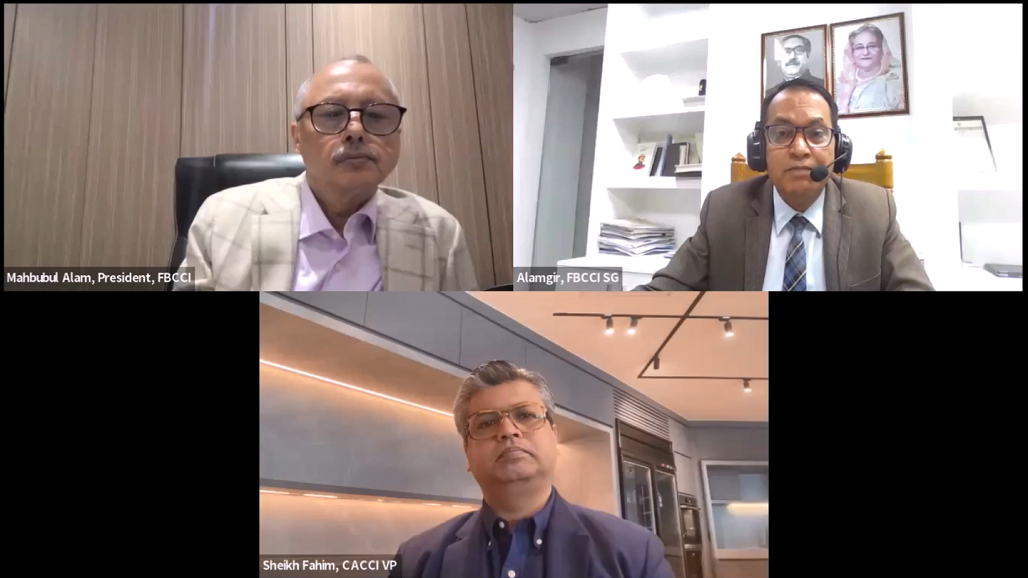Jointly organized by the Federation of Bangladesh Chambers of Commerce and Industry (FBCCI) and CACCI (ABA’s parent organization), the 60-minute webinar presented important statistics on import and export levels as well as products that are currently geared towards export markets.
SUMMARY
Mr. Alam spoke about the resilience, determination and strategic partnerships that Bangladesh is currently building. He discussed about strong developments in garments and fresh-water fisheries in Bangladesh.
He described advancements in human resources development as large percentage of girls are being enrolled in primary and secondary education. Also, advances in national health conditions have reduced infant mortality rate dramatically.
Furthermore, he said that the government established an extensive social safety net that includes financial support and an investment friendly attitude in general that helps the economy maintain its rigor.
Mr. Fahim explained key economic features in the CACCI region such as a population representing 37.8% of the global population that produces 19.6% of the global GDP and some 19.7% of global exports.
Mr. Fahim also mentioned that CACCI has issued an important study on the value chain of Asian economies as China’s manufacturing evolves. Another point on his presentation was the Green Alliance Initiative established by the Singapore Manufactring Federation early in 2024. He said that such Initiative will help Asian SMEs work towards reduced carbon footprints.
Mr. Alamgir’s extensive presentation started with the observation that despite global turmoil, Bangladesh is growing because of two key factors: people’s resilience and a resourceful business community.
The country has a very young population, with 45% of its inhabitants at around 24 years of age, adding that some 4 to 7 million people have access to the Internet.
He said that there is political will in Bangladesh to create a business friendly environment for foreign investment. In fact, Bangladesh will be graduating into the middle income country group by 2030. Furthermore, it has set its goals for much higher income levels by 2041. To achieve these goals, Bangladesh wants to provide opportunities to foreign investors so they can transform into global business players.

The Prime Minister Office, the Ministry of Finance, and many other agencies are actually involved in fostering economic growth and business opportunities.
Bangladesh’s area is just as big as one state of the United States at 48,460 square kilometers but its population is much larger at 170 million inhabitants, the 8th largest in the world. With a GDP standing at US$459 billion in 2023, Bangladesh ranks 30th in the world.
Bangladesh has consistently improved its business climate to the point that it has not experienced negative GDP growth for decades and has grown at. 6% to 7% annually for almost 3 decades. According to the World Bank, it will continue to grow year after year into the future.
Bangladesh’s imports are larger than its exports at US$55.5 billion with cotton being the major import item, followed by steel bars, cereal, machinery, energy, and crude. Cotton is mainly used in the garments industry while oils imports are used to generate energy.
China is Bangladesh’s primary source of imports at around US$20 billion, followed by India, Singapore, Malaysia, and Indonesia.
In terms of top export markets, United States comes first, followed by Germany, UK, Spain, France, Netherlands, and India.
Alamgir mentioned opportunities in trade and investment such as footware, leather, garments, etc.. The flourishing ones are electronics and IT, frozen food. leather, and power, light engineering, automobiles, light industries. These are nascent industries that wiill flourish in the years to come.
Bangladesh has also streamlined its regulatory framework and now hosts 97 industrial zones ready for investments with very favorable tax incentive programs and exemptions for investors, allowiing up to 100% foreign ownership.
For instance, Banglesh features bonded warehousing facilities, and biotechnology operations from over 31 different countries.
During the second part of his presentation, Mr. Alamgir explained the role and activities that FBCCI organizes.
He said that FBCCI wants to become a place of business excellence, including policy advocacy mechanisms so that FBCCI becomes a trusted name among businesses. FBCCI’s main objective is to empower growing businesses by building a resilient business community. Thus, the Federation coordinates and promotes trade and investment fairs at home and abroad.
FBCCI also provides views on different issues related to government policies, trade, tax and investment. It wants to help companies increase productivity envisioning 2041, as one benchmark to achieve a happy and prosperous Bangladesh through investment.
The presentation files can be downloaded from the CACCI website HERE.
The video recording of the presentation can be viewed at the CACCI YouTube channel HERE.

